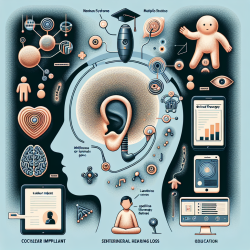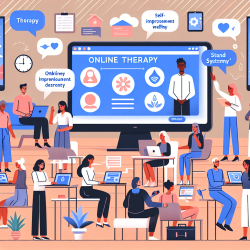Introduction
In the realm of special education and therapeutic interventions, understanding the nuances of genetic disorders such as Noonan Syndrome (NS) and Noonan Syndrome with Multiple Lentigines (NSML) is crucial for practitioners. These syndromes, characterized by a mutation in the PTPN11 gene, present with a range of clinical manifestations, including hearing loss. The recent research article titled "Cochlear Implantation in Noonan Syndrome With and Without Multiple Lentigines: A Case Report and Systematic Review" provides valuable insights into the outcomes of cochlear implantation (CI) in this unique population.
Understanding the Research
The study highlights the significant audiologic improvements observed in patients with NS and NSML following cochlear implantation. Despite anatomical challenges, CI was surgically successful, leading to enhanced auditory performance over time. However, the study also underscores the variability in speech and language outcomes, often influenced by underlying cognitive deficits.
Implications for Practitioners
For practitioners working with children diagnosed with NS or NSML, this research emphasizes the importance of early diagnostic and therapeutic interventions. Here are some key takeaways:
- Early Intervention: Early genetic testing and intervention are critical for improving long-term audiologic and speech development in patients with NS/NSML.
- Multidisciplinary Approach: Given the heterogeneity of these syndromes, a collaborative approach involving otolaryngologists, audiologists, and speech-language pathologists is essential for optimal outcomes.
- Parental Education: Educating parents about the potential variability in outcomes is crucial. While CI can significantly improve hearing, speech development may not progress as expected due to cognitive factors.
- Continued Research: Encouraging further research into the genetic underpinnings of NS and NSML can lead to better-targeted interventions and improved prognostic discussions with families.
Encouraging Further Research
The study also highlights the need for more research to identify specific genetic mutations associated with treatment-resistant behavioral delays. Understanding these genetic nuances can enhance clinical decision-making and improve CI outcomes for patients with NS and NSML.
Conclusion
The findings from this research provide a foundation for improving clinical practice and patient outcomes in the context of NS and NSML. By integrating early intervention strategies and fostering a multidisciplinary approach, practitioners can better support children with these complex syndromes.
To read the original research paper, please follow this link: Cochlear Implantation in Noonan Syndrome With and Without Multiple Lentigines: A Case Report and Systematic Review.










